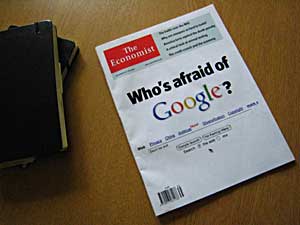Bill Thompson’s latest BBC column. No free iPhone for him, then!
Nonsense on stilts about Northern Rock
Here’s the BBC’s sing-song Business Editor, Robert Peston, blogging about the banking crisis. First he says that:
the Bank of England consistently said that its system for providing liquidity didn’t need overhauling.
It claimed that to do so would be to bail out banks which had lent or invested in an injudicious way – and it had no intention of doing that.
It has now changed its mind.
The Bank has agreed to accept mortgages from banks as collateral against three month loans.
Baffled?
It’s the equivalent of opening up a whole new reservoir in the water system.
But here’s the humiliation for the Bank.
If it had done this three weeks ago when banks were clamouring, Northern Rock might never have feared that it was running out of money.
So it would not have had to approach the Bank of England for emergency support.
And there would never have been that infamous run on Northern Rock – the first run on a British bank for 140 years.
The possibility that the flight of capital from Northern Rock could have been avoided is seriously embarassing for the Governor of the Bank of England, Mervyn King, one of whose functions is to maintain financial stability…
But then, further down the same post, we find this:
IMPORTANT UPDATE: 19:59 The Bank of England has now told me that individual banks can only apply for £1.5bn each under the £10bn facility. It says that Northern Rock would have needed far greater funds – and that if this finance had been provided three weeks ago or so, the liquidity would not have eliminated the Rock’s funding difficulties.
Which comprehensively up-ends his argument. But dear old Peston can’t quite bring himself to admit that he’s got it wrong. He continues:
It is slightly odd that the Bank should divulge this to me now, because it failed to provide this detail (or any answer at all) when I asked this afternoon whether what it announced today could have provided succour to Northern Rock. So although the Bank of England has changed course in respect of the way it is prepared to tackle the crisis in the money markets, it is sticking to the position that it has no regrets about the way that it provided its initial support to Northern Rock.
This is lazy, incompetent journalism. What’s actually going on is that Peston and other hacks are — wittingly or unwittingly — being co-opted into scapegoating the Bank of England Governor, Mervyn King, who is the only person in the drama so far to have acted with intelligence and judgement. The managers and Board of Northern Rock took disgraceful risks with customers’ money. But Peston & Co are now reporting that “what happened at Northern Rock, the first run on a British bank in living memory, has caused deep shame and embarrassment in the banking industry. It is not the sort of thing that is supposed to happen here. Senior bankers are livid and looking for someone to blame.”
‘Shame and embarrassment’ from an industry which, until the credit crunch broke, had been lauding Northern Rock’s adventurous business model. Give me a break.
Peston’s idiotic coverage highlights another aspect of the whole affair — the BBC’s role in fuelling the panic. There are lots of echoes of the fuel ‘crisis’ of 1999, when a small group of grievance-emboldened thugs briefly held the country to ransom and caused the Blair government to panic. One of my friends was a BBC reporter at the time, and sought to provide a properly balanced account of the crisis, including a sceptical account of the ludicrous ‘grievances’ of the protestors. Eventually, his editors told him to tone it down. He asked why. “We have to stay closer to the people” was the reply. The injunction, he was given to understand, had come all the way from the top of the BBC — which at that time was Greg Dyke, the well-known populist.
Imperial arrogance
From Good Morning, Silicon Valley…
“We are concerned that the standard applied to unilateral conduct by the [EU Court of First Instance in the Microsoft antitrust case], rather than helping consumers, may have the unfortunate consequence of harming consumers by chilling innovation and discouraging competition.”
— Thomas O. Barnett, U.S. Department of Justice assistant attorney general for antitrust
“The European Commission does not pass judgment on rulings by U.S. courts and we expect the same degree of respect from U.S. authorities on rulings by EU courts. It is absolutely not done.”
— EU antitrust chief Neelie Kroes
We’re all bankers now
I must be going potty. Reason: I find myself in agreement with Simon Heffer, the carpet-chewing Torygraph columnist. He’s not impressed by the way the government has overridden the intelligent and measured stance taken by Mervyn King, Governor of the Bank of England, towards Northern Rock.
Taxpayers have now become bankers. At a stroke, the fundamentals of the capitalist creed on which many of us thought our economy was based are compromised. There is no price on risk, except that paid by the state with our money.
Many in the financial world have what we might call a conservative interpretation of the idea of lender of last resort, and so do I.
I think it was shared by the Governor of the Bank of England, Mervyn King. It was that the Bank will lend at an appropriately stiff interest rate to any solvent financial institution that has a temporary liquidity problem, so it can right itself.
This is roughly what Mr King said, and did, last week, when Northern Rock was given a cash lifeline. The Governor could, or should, have done no more.
He is not a political figure, and it would have been most improper for him to act as one. It would also have been most improper of him to extend the role of lender of last resort to an extreme that imperilled the very notion of capitalism. That is the sort of thing idiot politicians do and, by God, have they gone and done it.
Fearing, quite absurdly, a collapse in our banking system, with Weimar-style queues littering our high streets at almost every bank and building society, the Chancellor of the Exchequer decided to issue his blank cheque to the bankers of Britain.
They now, as I see it, have carte blanche to take the most awesome risks with the money of their depositors, knowing that if they goof badly, the taxpayer will compensate their aggrieved customers.
The funny thing was that as I watched the TV news the other night, with all that footage of people queueing outside Northern Rock branches, I was almost tempted to buy shares in the bank, on the grounds that they were bound to go back up. Which of course they will now do.
Needless to say, I did nothing about this startling insight. Sigh. Story of my life: I also knew that Google shares were grossly undervalued at $85 when the company floated on the stock market.
Jeff Randall has written an instructive piece on ” Ten lessons we can learn from the Rock that rolled downhill”.
Jobs: why no 3G
Ah, I see. It’s the battery life.
Apple chief executive Steve Jobs slammed 3G phones for having limited battery life as he launched the iPhone in the UK through an exclusive deal with network operator O2.
O2 is thought to have signed an unprecedented agreement passing around 10pc of all revenues from the iPhone to Apple, whose tough commercial terms some other mobile networks baulked at.
One of those was Vodafone, whose chief executive Arun Sarin has pointed out that the first version of the iPhone will not run on 3G mobile networks, thus offering only the slower web browsing speeds of 2.5G unless customers are in a wi-fi hotspot. Mr Jobs, however, said Apple had decided against incorporating 3G for now because it drained battery life. “The 3G chipsets work well apart from power. They’re real power hogs. Most phones now have battery lives of two to three hours,” he added.
“Our phone has eight hours of talktime life. That’s really important when you start to use the internet and want to use the phone to listen to music. We’ve got to see the battery lives for 3G get back up into the five-plus hour range. Hopefully we’ll see that late next year.”
Translation: It will give us an opportunity to force all those early adopters to upgrade after the Christmas rush.
Beware of flying balls

A sign at Brancaster on the Norfolk coast on Sunday last. Note warning about “flying golf balls”. The beautiful links course behind the sign is that of the Royal West Norfolk club. It was laid out in 1892 and hasn’t changed much since — which is another way of saying that it was pretty good from the beginning. “Few things are more terrifying than the first hole at Brancaster on a cold, raw, windy morning,” wrote Bernard Darwin in The Golf Courses of the British Isles (1910), “when our wrists are stiff and our beautiful steely-shafted driver feels like a poker. There is a bunker – really a very big, deep bunker – right in front of our noses.”
Regulatory teeth

This may seem a strange image with which to illustrate a post on the Microsoft judgment, but bear with me. As my mother used to say when confiscating pocket-money for some misdemeanour, “it isn’t the money, it’s the principle”. I can’t imagine that even a $613 million fine will make much of a dent in a company that has a market cap of $300 billion and is sitting on nearly $50 billion in cash and marketable securities.
I can’t even get worked up about seeing Microsoft finally coming unstuck (though it couldn’t have happened to a nicer company), because in a way the caravan has moved on. The company’s monopoly hold on the PC desktop is still a reality, of course, but it’s a wasting asset in a networked world. The most interesting implication of the European court’s decision is what it might mean for other companies — Apple and Google, to name but two. Just as sharks are encouraged by the sight of blood, the sweeping legal success regulators have enjoyed in the Microsoft case may have whetted their appetite for more. Apple’s grip on the music-download market provides one obvious target (especially in view of the widespread European concern for ‘interoperability’). And Google’s stranglehold on “all the world’s information” will eventually put it squarely in the crosshairs of the European regulatory system. Stay tuned.
The text of the Court of First Instance judgment is here, btw.
More: I forgot to mention Intel as another possible target for Euro-regulators. And this week the European Commission is opening hearings on a complaint that the iTunes store violates competition rules by charging Britons more than other Europeans for downloads.
Light and shadow

A kitchen table, in September light.
Jobs descends from clouds, launches UK iPhone, departs
No surprises here, then.
Apple has announced that its long-awaited iPhone will go on sale to British customers on November 9.
The handset, which will be available exclusively to O2 customers, will cost £269 – more than the $399 (£200) that it costs in the US.
The iPhone will sell for £269.
Users will have to sign an 18-month contract priced at either £35, £45, or £55 depending on the call package.
Steve Jobs, Apple’s CEO, appeared in person at the company’s flagship Regent Street store in London for the announcement.
Still no 3G, I see. I’ve used one, courtesy of my friend Hap. It’s neat and hooked up easily to my home WiFi. But in the open it’s still a 2.5G phone.
Covering Conflict: a photographic essay
Wonderful, sobering sequence of Magnum photographs from conflict zones with a commentary by the BBC’s Robin Lustig.
